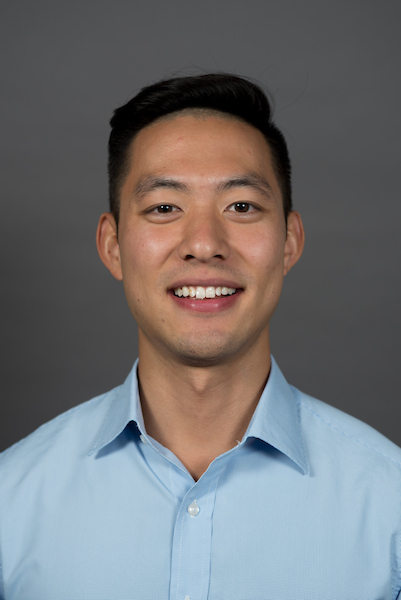Disrupting Inefficient Healthcare Processes Using Artificial Intelligence
Health data can tell us many things: the number of daily COVID-19 cases, rates of disease by demographic category, or even food inspection lists by state.
 Eric Yang (MSAI ’19) knows firsthand just how much health information is available from his experience as a technical consultant and engineer at Epic Systems, an electronic health record company. Being exposed to the inner world of the health care system and the “troves of data each healthcare network sits on,” he said, inspired him to dig deeper. He joined Northwestern Engineering’s Master of Science in Artificial Intelligence program in 2018, where he was part of the first cohort of students.
Eric Yang (MSAI ’19) knows firsthand just how much health information is available from his experience as a technical consultant and engineer at Epic Systems, an electronic health record company. Being exposed to the inner world of the health care system and the “troves of data each healthcare network sits on,” he said, inspired him to dig deeper. He joined Northwestern Engineering’s Master of Science in Artificial Intelligence program in 2018, where he was part of the first cohort of students.
“Through my work at Epic, I realized many processes and workflows were outdated and exceedingly inefficient,” Yang said. “These characteristics make the health care industry ripe for artificial intelligence (AI) solutions, and I wanted to be part of the disruption.”
Now an alumnus and digital innovator at Sumitovant Biopharma, Inc., Yang reflected on the lessons and skills he learned, and how they helped him pivot his career.
What interested you about Northwestern’s MSAI program, specifically?
First, the curriculum was comprehensive and hit on all of the topics I was interested in for data science, machine learning, and deep learning. Also, I had loved my time at Northwestern as an undergraduate biomedical engineering major (BS ’15) so I jumped on the opportunity to return.
I also believed in the vision of Bill and Cathy Osborn Professor Kris Hammond, director of the program, of pulling in people from all backgrounds and domains and empowering them with the technical skills necessary to apply AI in an effective manner. For career reasons, I wanted to come out of the program with a resume with compelling project experience to attract full-time job offers. To do that, the projects had to be real — not simply pet projects or re-implementations of existing algorithms for a class. This is where Northwestern really shines, and I knew this from my experiences as an undergrad. Northwestern as a whole has so many world-class departments working on the bleeding edges of almost every domain. So, as part the MSAI program, you also have access to that network to collaborate on projects that really matter.
Were your expectations going into the program met?
Yes, absolutely. I had the opportunity to collaborate with Louis Simpson and Kimberly Querrey Professor John Rogers and his world-renowned biomedical lab, as well as with the radiology department at Northwestern University’s Feinberg School of Medicine.
What was one of the most important lessons you learned in the MSAI program?
If you want to build out a system that actually provides value, start from a real, tangible problem and build a solution catered to that. Not the other way around. You can’t fabricate need, and adoption of a new system is much better when users are already craving a better solution.
What were some of the most valuable skills or experiences you gained in the MSAI program?
Honestly, learning to hack things together and building out infrastructure. At the start of each of my projects, it required a bit of hacking to get whatever type of data I had into a clean, standardized input to my system. Sometimes that input was a three-channel timeseries signal from a proof of concept biomedical sensor, and sometimes that input was raw 3D MRI files. I'd be lucky if pipelines already existed for my specific data in its raw format. So being able to build out an infrastructure to aggregate, pre-process, and store the data in an efficient manner made my life much easier when I went through the iteration process and will help me in any project going forward.
How did your MSAI degree impact your career after graduation?
My goal career-wise was to make a bit of a pivot into a more technical role, and my MSAI degree was instrumental for this. I didn’t have any focused computer science classes under my belt, and having a master’s from Northwestern’s Computer Science Department helped out a lot in that regard. I was able to show that I had formal training in data science, machine learning, and deep learning. But more importantly, I was able to show through my projects that I was able to apply these concepts on real industry problems. For any company that was looking to hire, that was much more compelling.
Is there anything else you’d like to add about your experience in the program?
What made MSAI what it is wasn’t the catalog of courses. It was everything surrounding them and in-between. I had the luxury of being a part of a small cohort, so we naturally grew pretty close and learned to work together well, which fostered a collaborative environment--not just for team projects, but also for study groups and help debugging code.
For all of us who had the question, “What exactly do I want to do after this program?” looming over our heads, the face time with industry partners gave us a necessary break from the classwork to consider whether we could see ourselves working long-term in their domain. If we ever had any tough career decisions to make, wanted help on a presentation to industry partners, or even had suggestions on how to improve something, Kris and the MSAI program staff always had an open door. I always had the support I needed, which let me focus my time on the important things.

